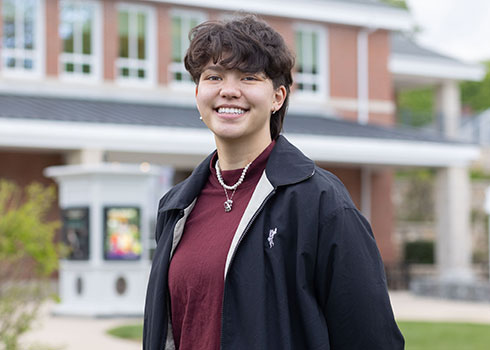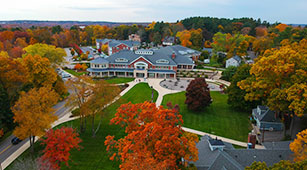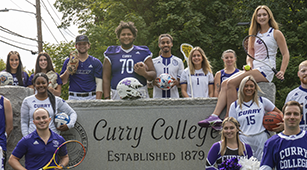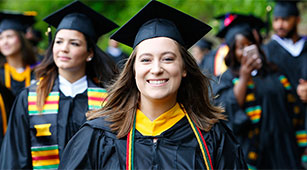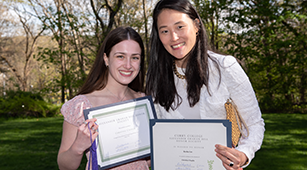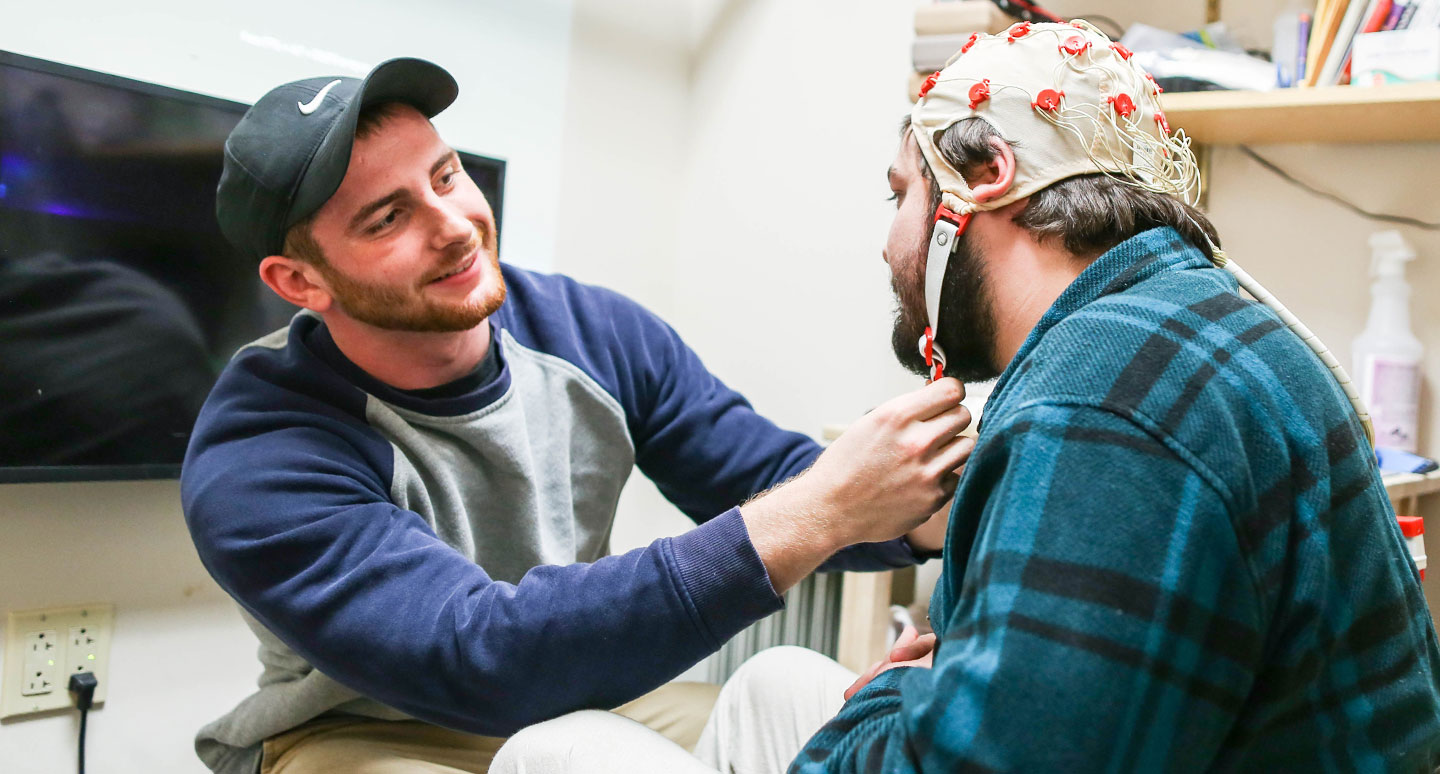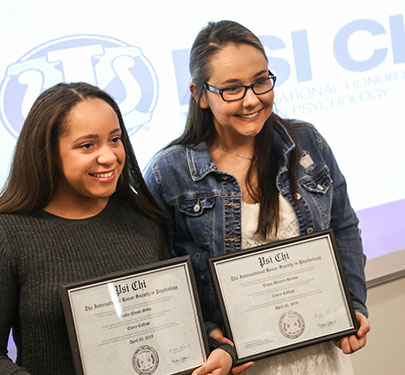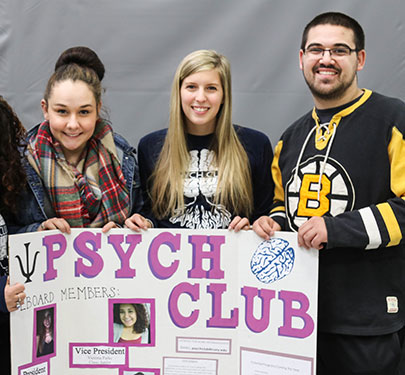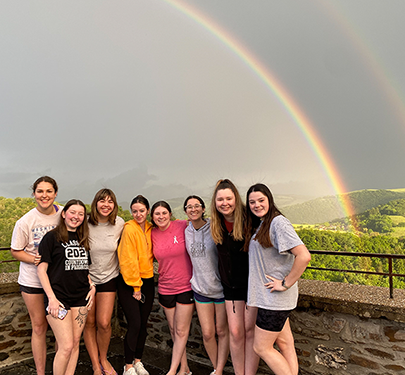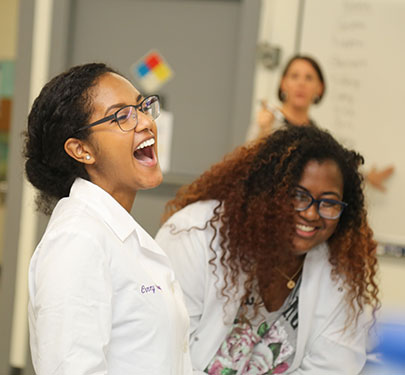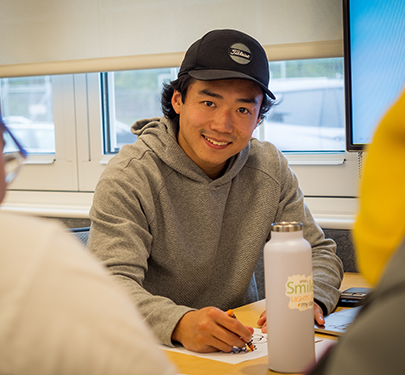
Not a traditional undergraduate student? Visit our continuing education Psychology degree program...
In a world faced with unprecedented challenges and uncertainties, it is more important than ever to develop the tools necessary to promote positive mental health, resiliency, and well-being. A degree in Psychology from Curry College will not only provide you with the resources to help enhance immediate and long-term emotional, social, and psychological functioning, but will also equip you with the skills to make your mark in nearly every field and every profession – from human services to health care, from counseling to crisis intervention, from business to education, from public relations to law, from advertising to child care, from human resources to marketing, and so many more.
When you major in Psychology at Curry College, you will develop critical thinking skills and discover new passions, and you will grow as an individual and future professional. Learn how the brain influences behavior and mental processes. Explore and understand the biological, psychological, social, and cultural factors that affect how and why people think, feel, and act as they do. Our program teaches Psychology as a science, but we emphasize Psychology’s practical applications for promoting human welfare and helping address the psychosocial needs of others. Our small classes are taught by faculty who are experts in the field of Psychology. Teaching and inspiring are their top priorities, and they are dedicated to helping you reach your educational, professional, and personal goals.
Make an Impact with a Degree That Opens Doors
Join a dynamic Psychology program at Curry College that’s deeply connected to the community and committed to making a difference. With access to 70+ internship sites, on-campus practicum opportunities, and collaborative research projects with expert faculty, you’ll gain real-world experience that sets you apart. Present your findings at respected events like the New England Psychology Association Conference and build a portfolio that speaks volumes. Our graduates don’t just earn a degree—they launch careers. With a B.A. in Psychology from Curry College, you’ll be equipped with in-demand skills employers value: communication, interpersonal insight, critical thinking, project management, and a deep understanding of human behavior. Whether you're pursuing graduate studies or entering the workforce, you'll be ready to lead from day one.
Explore Our State-of-the-Art Brain and Behavior Lab
- EEG Research
- Invertebrate Studies
- Neuropsychology Research
- Faculty-Led Research
- Advanced Research
- Conference Presentations
New and Innovative AI Courses
- Introduction to Artificial Intelligence
- AI and Human Behavior
- Applied AI for Social Media and Behavioral Insights
- AI Tools for Psychological Research and Productivity
Related Opportunities
Psychology majors who earn a B.A. degree at Curry College are prepared for many endeavors. Employers of all stripes will want and need your communication and interpersonal skills; your critical thinking, project-management, and problem-solving skills, and – most importantly – your strong understanding of human behavior.
Just a few of the many career options include:
- Career Counseling
- Clinical Work
- Crisis Counseling
- Education Administration
- Human Resources
- Law Enforcement
- Medicine
- Mental Health Case Manager
- Mental Health Technician
- Probation Officer
- Research Assistant
- Residential Youth Counselor
- Social Services
- Substance Abuse Counselor
Popular internships have included:
- Boston Medical SPARK
- High Point Treatment Center
- The League School for Autism
- The May Institute
- Mental Health Legal Advisors, Quincy
- Milton Public Schools
- New England Center for Children
- Pembroke Hospital
- South Shore Therapies
- The Trauma Center
- The Walker School
The intended learning outcomes for Psychology Department are the same as those specified by the American Psychological Association (APA), as described in APA Guidelines for the Undergraduate Major:
- Knowledge Base in Psychology: Students should demonstrate fundamental knowledge and comprehension of the major concepts, theoretical perspectives, historical trends, and empirical findings to discuss how psychological principles apply to behavioral problems. Students completing foundation courses should demonstrate breadth of their knowledge and application of psychological ideas to simple problems; students completing a baccalaureate degree should show depth in their knowledge and application of psychological concepts and frameworks to problems of greater complexity.
- Scientific Inquiry and Critical Thinking: The skills in this domain involve the development of scientific reasoning and problem solving, including effective research methods. Students completing foundation-level courses should learn basic skills and concepts in interpreting behavior, studying research, and applying research design principles to drawing conclusions about psychological phenomena; students completing a baccalaureate degree should focus on theory use as well as designing and executing research plans.
- Ethical and Social Responsibility is a Diverse World: The skills in this domain involve the development of ethically and socially responsible behaviors for professional and personal settings in a landscape that involves increasing diversity. Students completing foundation-level courses should become familiar with the formal regulations that govern professional ethics in psychology and begin to embrace the values that will contribute to positive outcomes in work settings and in building a society responsive to multicultural and global concerns. Students completing a baccalaureate degree should have more direct opportunities to demonstrate adherence to professional values that will help them optimize their contributions and work effectively, even with those who do not share their heritage and traditions. This domain also promotes the adoption of personal and professional values that can strengthen community relationships and contributions.
- Communication: Students will demonstrate competence in writing and in oral and interpersonal communication skills. Students completing foundation-level courses should write a cogent scientific argument, present information using a scientific approach, engage in discussion of psychological concepts, explain the ideas of others, and express their own ideas with clarity. Students completing a baccalaureate degree should produce a research study or other psychological project, explain scientific results, and present information to a professional audience. They should also develop flexible interpersonal approaches that optimize information exchange and relationship development.
- Professional development: The emphasis in this goal is on application of psychology-specific content and skills, effective self-reflection, project-management skills, teamwork skills, and career preparation. Foundation-level outcomes concentrate on the development of work habits and ethics to succeed in academic settings. The skills in this goal at the baccalaureate level refer to abilities that sharpen student readiness for postbaccalaureate employment, graduate school, or professional school. These skills can be developed and refined both in traditional academic settings and in extracurricular involvement. In addition, career professionals can be enlisted to support occupational planning and pursuit. This emerging emphasis should not be construed as obligating psychology programs to obtain employment for their graduates but instead as encouraging programs to optimize the competitiveness of their graduates for securing places in the workforce.
